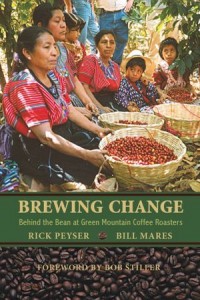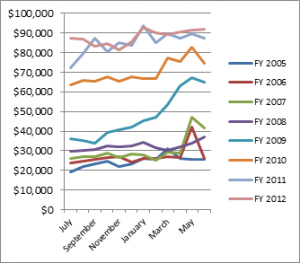A heads up: The registration deadline for Whole Farm Planning for Beginning Women Farmers has been extended to November 15th. Find the application here.
Thursday (Nov 1)
Book Discussion: Brewing Change
Part travelogue, part inspiring social commentary, and part motivating business model, Brewing Change is about one middle manager’s quiet, dogged crusade to change the world of coffee. Long-time friends Bill Mares and Rick Peyser team up to tell the story of Peyser’s career within industry pioneer Green Mountain Coffee Roasters, and of his travels throughout the coffee lands of Latin America and East Africa.
7pm. Phoenix Books. Burlington. More information here.
Find more (food and other) book events on the Phoenix Books calendar.
Friday (Nov 2)
Monthly Wine Dinner
Chef Dennis Vieira cooks a special Portuguese menu of local food designed to accompany the simply delicious sips.
6pm. Red Clover Inn & Restaurant. Killington. $75 plus tax and tip. Please make your reservation here.
Find more food events on the Seven Days calendar.
Saturday (Nov 3)
Medicinal Mushrooms for Health and Vitality
In this workshop, Sylvia Gaboriault will review the medicinal value of several mushrooms, as well as ways to use them as food and medicine. Samples and recipes will be shared.
10-11:30am. City Market. Burlington. Members $5/Non-members $10. Please preregister here.
Find more foodie events on the City Market calendar.
Sunday (Nov 4)
Harvest Swap
Here’s your chance to try someone else’s homegrown handiwork and bring some more variety to your pantry. Bring items that you have grown and/or preserved to swap. Items will be swapped on a one for one basis. Bring items with an estimated value of $5 or $5 increments. For example: a quart of canned tomatoes, a jar of jelly, a loaf of bread, etc. Bring an extra item for sharing a taste at the event if you like.
2-4pm. Lakeview Elementary School. Greensboro. For more information, call 802-755-6336 or email swapsisters@gmail.com.
Find more foodie events on the NOFA VT calendar.
Monday (Nov 5)
Trick or Treat with the Horses
Join us at the UVM barn when students and their horses will be dressed in “not too spooky” costumes and pass out candy to trick-or-treaters.
5-6:30pm. 500 Spear Street. Burlington. Free. More information here.
Wednesday (Nov 7)
Stormwater Runoff: Treatment opportunities in urban residential landscapes
Stephanie Hurley discusses design concepts and precedent projects, suitable for residential areas, which help slow the flow of storm water runoff, removing phosphorus and other water pollutants along the way. Rain gardens, rain barrels, porous pavement, and more; design with water quality and aesthetics in mind. Learn how your property can be a part of cleaning up Lake Champlain!
6-8pm. 65 Green Mountain Dr. South Burlington. $10/$20 (fees will be collected at the event). Please preregister by emailing info@friendsofthehortfarm.org.
Scaling Up for Sales to Institutions
We are seeking farmers and other local food producers who wish to expand their sales and marketing options to include institutional selling or producers who want to increase their current institutional market sales. Please read the details in the attached announcement. Space is limited and interest is high. Sponsored by Sodexo, the Vermont Agency of Agriculture, Food & Markets, NOFA-VT, and the Vermont Sustainable Jobs Fund.
10am-3pm. UVM Davis Center. Burlington
Other places to find Vermont food events:
Hunger Mountain Coop, Montpelier
Kellogg Hubard Library, Montpelier
Mad River Localvores’ calendar
Know a website to go here? Email the link to haylley.johnson@uvm.edu.


















